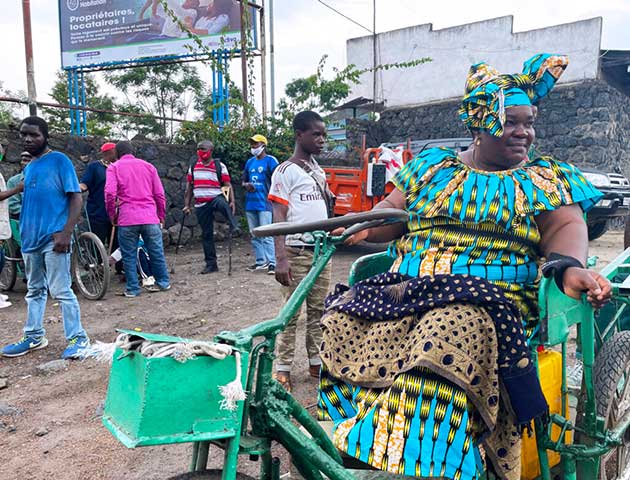Sylvain Kakule Kadjibwami lost the use of his legs during one of those ambushes that bloodlessly bleed North Kivu. “When I was shot, I thought it was the end of my life, but when I shared it with other disabled people, I discovered that life is still possible,” he said. Now it is Covid-19 that risks destroying the dreams of Sylvain, a small trader from Goma, a city whose roads are volcanic rock-ridden screes where pick-ups trudge. Those who walk face the risk of falling at every step. However, for those who cannot, the same roads can become traps where it is not only war that kills but also a stigma fostering misery and disease.
Confined to their homes by poverty, even before the pandemic, people living with disability in the capital of North Kivu, in the East of the Democratic Republic of the Congo, must overcome obstacles higher than those erected by the lava of the Nyiragongo. They are obstacles made even more challenging by the coronavirus containment measures that are severely affecting the fragile local economy, made up of informal activities and community solidarity.
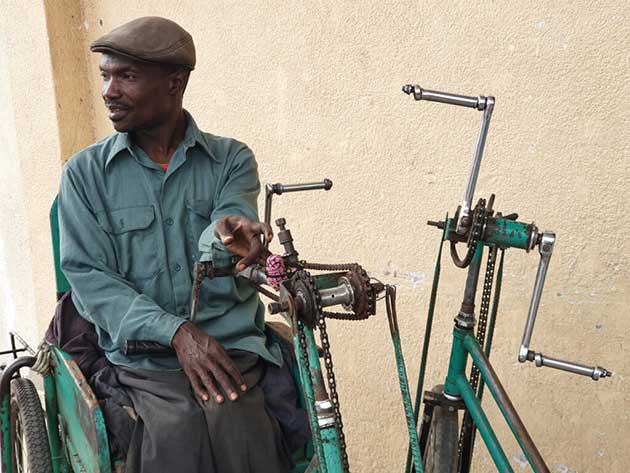
“Since the outbreak of Covid, here, in North Kivu, more than a dozen disabled people have died not because they had Covid: They have died of hunger because they had nothing to eat,” Herman Cirimwami, coordinator of the Paph, a Congolese organization that assists and protects people with disabilities, including promoting their rights and social inclusion, told Degrees of Latitude.
They die because they survive thanks solely to the solidarity of their communities, friends, and families. However, confinement has reduced everyone’s incomes along with the economic capacity of those who took care of people unable to provide for themselves. The disabled live off charity because employment has always been almost inaccessible to them.
“Most of them also beg in the street, because they can’t access employment or get a good job,” said Therese Mabulay, athlete, president of the North Kivu Paralympic Committee, and founder of Asam – Stand up disabled, a small vocational training center for women and young people with disabilities. The reason lies in a rooted prejudice. The disabled are perceived as “useless” or even seen as the “devil,” as Cirimwami said still occurs to those suffering from albinism.
Between Goma and Rwanda, the crisis of small traders
The few people disabled who have managed to build a business are struggling to not slip into complete destitution, as is happening to the small traders who transport agricultural products across the border with Rwanda: flourishing commerce in the restless heart of the African Great Lakes region, which, for decades, has been tax-free for people with disabilities.
Corn, flour, bananas, plantains, cabbage, potatoes, beans: They use tricycles or rickshaws adapted for those who cannot walk. Propelled by the strength of arms or by men paid to push, they defy rough terrain, loaded almost to instability. These are small ventures that play a key role in the food market of North Kivu’s capital, providing goods at competitive prices compared to those who use trucks. They are exhausted by the eight-month closure of the border during last year’s lockdown, as well as by the costs of Covid tests and passes introduced after the pandemic began.
Jacques Bisimwa Mitima is president of the Association of People with Physical Disability Tuungane, which means “let’s unite” in Kiswahili. It is composed of two hundred and ten members who trade food across the “petite barrière” between the twin cities of Goma, in the DRC, and Gisenyi, in Rwanda. When we met him, he was coordinating a meeting that was a forest of hand-bikes, raised arms, and determination. Members—who tax themselves to help those in need pay for medical expenses or for funerals for those who cannot afford them—were electing new leadership and discussing financial solutions to the crisis. Their life has been harder after the Covid-19 outbreak.
“We have many difficulties. Some of our members have been evicted because they did not have the money to pay the rent. We spent the little money we had during the period of the border closure,” Mitima said. On his tricycle, the painted word “President” and the flag of the DRC are the graphic representations of the charisma of this man who started to trade almost twenty years ago. He has five children and other young members of the family to feed: thirteen people who live on his income. Before Covid, he told us, you could earn as much as fifteen dollars a day. Today, that amount is perhaps fifty cents: “We are looking for some money just to eat and we eat with difficulty,” he added.
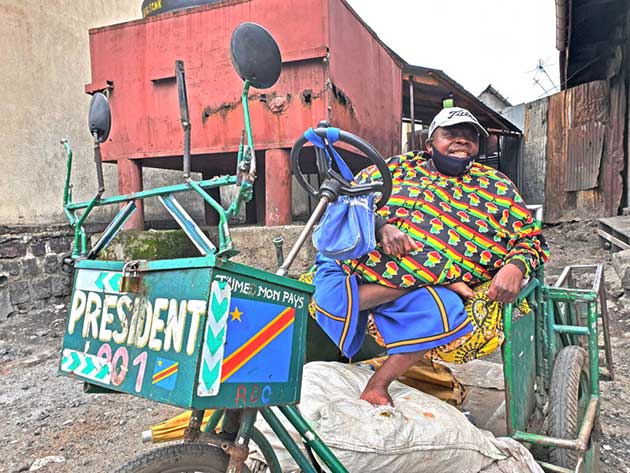
To cross the border, traders need the CEPGL, an administrative document from the Great Lakes Community that must be renewed every two weeks, as well as a Covid test, to be repeated every two or three weeks as well. Maman Soki, a mother of five, is also in the business: “We pay five dollars for the test and thirteen for the CEPGL … and the rickshaw must have the same documents too. So, you have to invest thirty-six dollars every two weeks. The small gain we might get is spent on customs,” she explained. “We live a really difficult life, but at least they have reopened the border.”
It can happen, however, that the documents necessary to travel must be renewed even before goods are sold. This pushes traders into the grip of debt, as Sylvain Kakule Kadjibwami told us. He was a driver before being wounded. “On April 28, 2009, our vehicle was attacked on our way back from Bunia. Armed bandits shot the car I was driving on the Kiwanja road in Rutshuru territory. Two people died in the cabin and I was injured. Behind us, there were nine other injured but I only know of one person who survived and who is now disabled like me. The bullets hit my legs and I still have metal in [my bones]. These fragments should have been removed for a long time, but I cannot afford to pay for a new operation.”
North Kivu’s war has made Goma a city where disability is a frequent condition. Grief inflicted by a war that has not ceased for decades can be read in the amputated limbs and tortured bodies of its population. “Since 2008, people have started fleeing to the city and have settled in refugee camps. It was difficult then to return to the villages and they remained [here] … I don’t have the exact figures, but I can estimate that fifteen percent of the population of Goma has a disability,” Cirimwami said. Not only is war a cause of injuries and physical and mental traumas but it also makes disabled people more vulnerable. According to Cirimwami, many are left alone when conflicts break out. They manage to escape only with difficulty and when they reach safer places, they often do not have the means to survive.
Kadjibwami thanks God. He is alive. He has a tricycle that can cost almost $400—the investment of a lifetime. If one of those expensive vehicles were to break, for many it would mean no longer being able to work because there is no money for repairs. Now the challenge for Kadjibwami is to imagine the future despite the pandemic. Business was good before the outbreak; he could send his children to school, feed them, and save for future projects. Now, there’s only uncertainty. “I can only dream according to my income and with this one, I cannot plan anything.”
The talent of fighting against prejudice
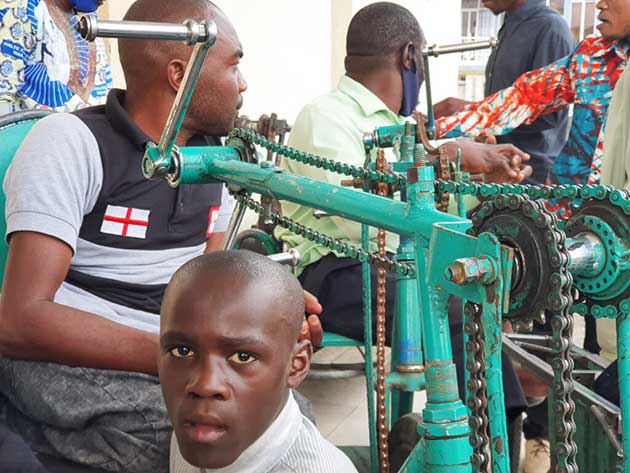
People with disability at the “petite barrière” want to return to living off their work. They do not ask the government for help, but wish to reduce the costs that weigh too much on their fragile income. “We don’t want to beg for our dignity,” Mitima said. It is a dignity that Congolese society still struggles to recognize at all, beyond the fragility of bodies and mind.
“Towards people with problems of mobility, or people with visual impairments, there is a stigmatization … the social environment thinks those people are useless,” Mabulay explained.
Getting married is still hard for women with disabilities, and they can easily be abandoned by their husbands if they give birth to disabled children. Thus, children are not always accepted at schools and even education is not a guarantee of landing a good job. Isolation is greater for those suffering from deafness or blindness: Without knowledge of sign language or Braille, information technologies remain inaccessible.
“When we try to practice sport, when we get them involved in sports, it is to show the community that people with disability have many talents, that they are persons like them, that they can do more if the society gives them a space which can allow them to be useful. For those who have [psychological] problems because they are neglected, our activity in sport is to show that they can have self-esteem, they can do more in society, they can’t be hidden in the houses but they have to show what they can do, their talents,” she added. “Our athletes feel integrated because they accept their disability, they can travel. The community is astonished when they play—wheelchair basketball, sitting volley—or when they sing. Some are singers too. They are proud.”
Making sport an integration tool, however, is a challenge that can be even harder than those faced by the athletes who brought the colors of the DRC to the Olympics in London and Rio, such as Rosette Luyina Kiese, who competes in shotput. Her right leg was amputated after she stepped on a landmine in the territory of Rushuru. In Goma, there is only an equipped space, built by the International Committee of the Red Cross, and athletes often have no money to buy equipment, or even wheelchairs to leave their houses and reach the Paralympic area. It is more difficult to reach the villages in rural North Kivu, where about one hundred and fifty armed groups are fighting. Yet the members of the Paralympic Committee continue to go to Sake, Rutshuru, Masisi, Lubero, and Beni and Butembo to advocate for practicing sport. “The greatest risk of working in conflict areas is the accessibility, kidnapping, and logistical resources to respond to the people in need,” said Mabulay, whose organization also implements vocation training.
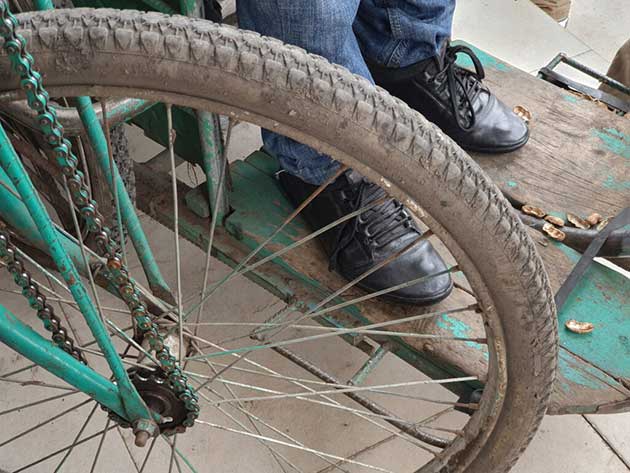
Denied rights and Covid-19 prevention
There are about two hundred and fifty athletes from the Paralympic Committee; about fifty are victims of war, but each awareness campaign reaches at least one thousand disabled people. This is a huge number for a single organization, but perhaps still small for a city that is estimated to have close to one million inhabitants and where the lives of most people with disabilities are consumed by poverty, between walls made of wooden boards and lava, in houses facing roads without asphalt and without light, where the water does not reach the kitchens but digs craters that only a 4 by 4 can wade through. The poor population struggles to eat and take care of themselves, vulnerable to disease and, today, more exposed than others to the risk of contracting Covid-19.
Despite the work of organizations such as those of Mabulay and Cirimwami, which provide sanitation and prevention, the situation is very serious: “In the families of these people there are no handwashers, there are no disinfectants … and thus, they are exposed to contamination from Covid. Similarly, people who go to Rwanda, pushed by others on the tricycle, cannot respect the distances of one meter; equally, the blinds, ”Cirimwami explained.
However, the health risks faced by people with disabilities are the result of longstanding limited access to basic social services and of an expensive health care system with few specialized facilities which leaves families with no other options than to “abandon the disabled at home,” Cirimwami said.
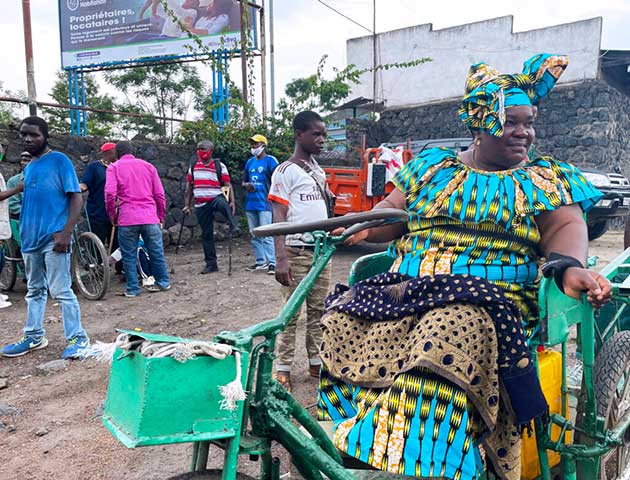
“Covid-19 came with more difficulties. Even to get information about Covid is not easy. [They] didn’t reach all kinds of disabled. People who can’t hear, who can’t move from their home, they have more difficulty being updated on the situation of Covid,” Mabualy explained. “Most of them can’t afford the kits, the safety kits to wash hands, to protect themselves.”
No access to health, education, employment, sport: That’s a question of denied rights.
Although the DRC has ratified the Convention on the Rights of Persons with Disabilities, the instrument has been neither properly implemented by the institutions nor disseminated to the population. “People do not know the rights of the disabled and so the marginalization continues both in the community and at the political and administrative level,” he explained. But people with disability want to have a voice in that decision-making process where “there is no one to take the disabled out of marginalization,” he added.
Mitima said it clearly when we met him in Goma: “The life of a disabled person is very difficult … We have no help from the government, sometimes we receive a few small sums from people of goodwill … But if we have to say that there is a person or institution that supports us, no, there isn’t. We can only count on ourselves.”
Elena Pasquini is an Italian journalist who visited DRC recently. She is founder and editor in chief of Degrees of Latitude
Source IPS

